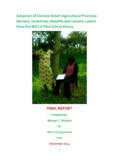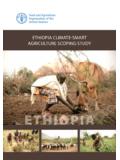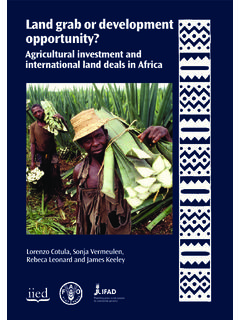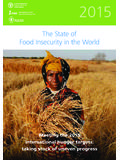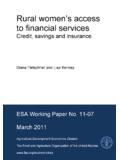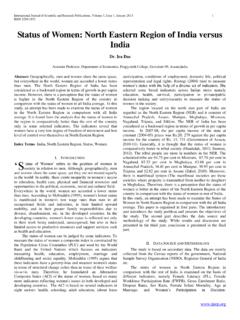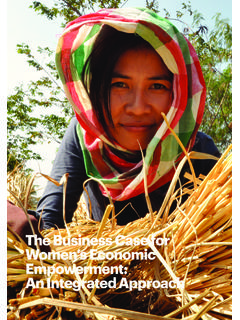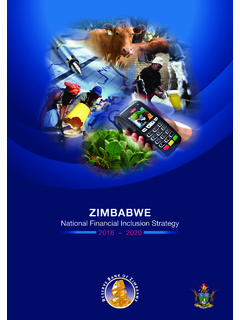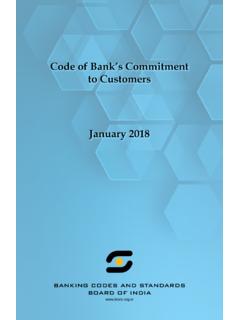Transcription of Why is action needed? - Food and Agriculture Organization
1 Gender and rural employment policy Brief #3rural women s entrepreneurship is good business !Rural women increasingly run their own enterprises, yet their socio-economic contributions and entrepreneurial potential remain largely unrecognized and untapped. They are concentrated in informal, micro-size, low productivity and low-return Enabling and gender responsive policies, services and business environments2 are crucial to stimulate the start up and upgrading of women s businesses and thereby help generate decent and productive work,3 achieve gender equality, reduce poverty and ensure stronger economies and societies.
2 Why is action needed ?Rural women s entrepreneurship can contribute to economic growth in developing countries and clearly represents an untapped potential. For many rural women , entrepreneurship is part of a broader livelihood strategy, often undertaken on a part-time basis, and where it is difficult to separate production and reproduction tasks, as well as market and non market With few employment choices, women often start businesses in highly saturated sectors, in the informal economy and in low-productivity and low return activities, where they benefit from little or no social discriminatory laws.
3 Regulations and social norms prevent women from starting and consolidating viable businessesLack of gender analysis, awareness of the issues, and political will can lead to discriminatory practices and gender-blind programmes and policies that perpetuate systemic barriers, fail to respond to women entrepreneurs needs and impede women s in rights and entitlements, whether economic, civil or family are a powerful source of discrimination against women , and can limit their access to and control over resources that are crucial to starting and consolidating a sustainable women entrepreneurs are often thwarted by discriminatory property, family and inheritance laws and practices.
4 Even when those laws and practices are equitable, women are often unaware of their rights to land and other productive resources or fear a backlash within the family or community if they claim you knoW?Micro and small enterprises offer a number of particular advantages for rural women : flexible hours, location in or near women s homes, ease of entry, and links with local markets. However, rural female entrepreneurs also face particular challenges entering new and lucrative markets and expanding their Cooperatives are a prominent form of sustainable enterprise for women in rural areas.
5 When they adopt gender-sensitive practices, they can increase women s empowerment, voice and representation in decision-making, provide a business network, enhance access to markets and services, and (consequently) facilitate economies of from developing countries highlights the importance of non-farm activities in the income-generating portfolio of rural households: the literature indicates that they account for 42% of the income of rural households in Africa, 40% in Latin America and 32% in are twice as likely as women to own a business with employees in developed and developing countries, except in East Asia, where their ownership rates are addition to income generation, entrepreneurship can legitimize rural women s control over resources.
6 This is important since women invest more in food and healthcare for their families and their children s rates of female land ownership can hinder access to financial assets that are necessary to set up a business. Available information suggests that less than 20% of agricultural land holdings in developing countries are operated by women (10% in Western and Central Africa and in the Near East and North Africa).9 ILO/M. Crozet2010 Social norms and attitudes influence women s and men s choices and op-portunities. women s entrepreneurship is not broadly accepted in many soci-eties and women face attitudinal ob-stacles in their starting, consolidating and developing a sustainable business.
7 women often enter a business when they are older, divorced or become household heads. Few young women see business development as an ap-propriate or viable livelihood option. Social norms and attitudes affect the implementation of laws, policies and programmes. Even though relevant laws and regulations may not be dis-criminatory on paper, discrimination of-ten takes place during their implemen-tation (or lack of implementation). 2. women face barriers to education, training and information Widespread illiteracy, low levels of edu- cation and lack of training and business education and experience can limit the capacity of rural women entrepreneurs to consolidate sustainable enterprises.
8 In Bangladesh for example, of rural women entrepreneurs have no formal education, and 17% cannot read or write and use mainly manual skills in their rural infrastructure and services for transport, electricity, and clean water further limit women s access to resources, markets and pub-lic services such as healthcare, and lengthen the time needed for house-hold, reproductive and care This, added to women s considerable agricultural work, creates time con-straints for non-farm business-related activities (including training and seeking information and business services).
9 Since women often operate home- based micro enterprises, lack access to transportation, and may be barred from accessing the same networks as men by societal norms and attitudes, their networks and contacts may remain weak while these are critical to connect entrepreneurs to growth limited access to financial and business services affects the growth of rural women s businessesFew banks operate in rural areas. Although financial institutions have increased access to micro finance in many countries, loans are seldom large enough to enable significant growth of entrepreneurs, particularly in rural areas, often experience difficulties accessing relevant financial products and services due to a lack of appropriate products, information, understanding of their needs and Development Services are not readily available in many rural areas where there is low population density.
10 Where they do exist, women may not access them due to low literacy, education, time, cost and mobility constraints or because these services do not serve their specific needs. women are left to rely on friends and family for management decisions and other support to their women s businesses are largely informal, failing to meet the decent work requirements women -led businesses often concen- trate in low paying, feminized markets (handicrafts, agricultural, fish and livestock products for local markets, food processing, sales of goods and services)


